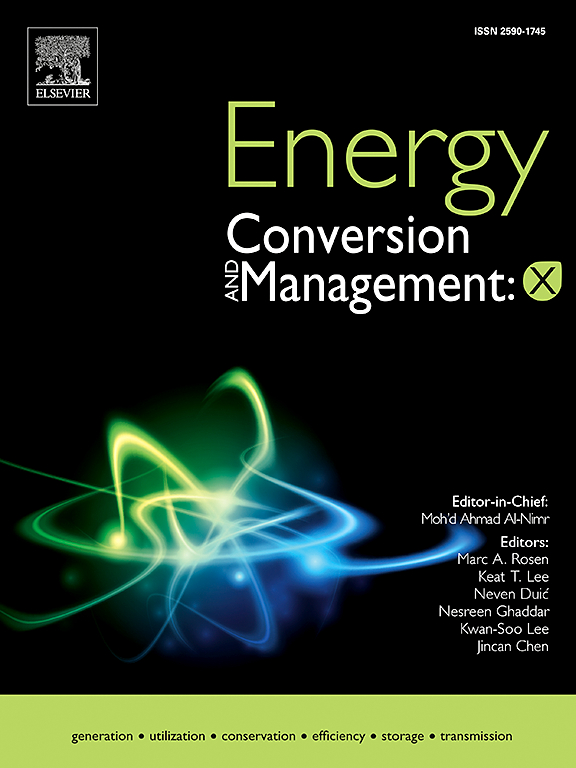Artificial intelligence-driven modeling of biodiesel production from fats, oils, and grease (FOG) with process optimization via particle swarm optimization
IF 7.1
Q1 ENERGY & FUELS
引用次数: 0
Abstract
This study presents the design and optimization of a biodiesel production process, emphasizing the integration of machine learning (ML) models and process optimization techniques. The biodiesel production process involves multiple stages, including feedstock preparation, esterification, and transesterification, with catalysts Amberlyst-15 and KOH used in continuous stirred-tank reactors (CSTRs). Sensitivity analysis reveals that high conversions of free fatty acids (94 %) and triglycerides (97 %) are achievable under optimized operating conditions. To enhance process efficiency, adjustments to reaction temperature, time, and methanol-to-oil ratios are proposed, resulting in lower energy consumption and material costs. A ML model evaluation, using various algorithms, identify XGBoost, Extra Trees, Gradient Boosting, LGBM, and Random Forest demonstrate the best performer for predicting process parameters, achieving an R2 value of nearly to 1. Particle Swarm Optimization (PSO) is then employed to optimize the selected ML model (XGBoost), leading to the identification of optimal input parameters for biodiesel production. The optimized process, combined with heat integration, reduces pre-heating energy requirements by 80.9 % and total heat duties by 19.9 %. The findings demonstrate the effectiveness of combining ML and optimization techniques to enhance biodiesel production efficiency while reducing costs and energy consumption.
人工智能驱动的脂肪、油和油脂(FOG)生物柴油生产模型,通过粒子群优化进行过程优化
本研究提出了生物柴油生产过程的设计和优化,强调机器学习(ML)模型和过程优化技术的集成。生物柴油的生产过程涉及多个阶段,包括原料制备、酯化和酯交换,催化剂Amberlyst-15和KOH在连续搅拌槽反应器(cstr)中使用。灵敏度分析表明,在优化的操作条件下,游离脂肪酸(94%)和甘油三酯(97%)的转化率较高。为了提高工艺效率,建议调整反应温度、时间和甲醇油比,从而降低能耗和材料成本。机器学习模型评估,使用各种算法,确定XGBoost, Extra Trees, Gradient Boosting, LGBM和Random Forest在预测过程参数方面表现最佳,实现了接近1的R2值。然后使用粒子群优化(PSO)来优化所选的ML模型(XGBoost),从而确定生物柴油生产的最佳输入参数。优化后的工艺,结合热集成,减少了80.9%的预热能源需求和19.9%的总热负荷。研究结果表明,将机器学习和优化技术相结合,可以提高生物柴油的生产效率,同时降低成本和能源消耗。
本文章由计算机程序翻译,如有差异,请以英文原文为准。
求助全文
约1分钟内获得全文
求助全文
来源期刊

Energy Conversion and Management-X
Multiple-
CiteScore
8.80
自引率
3.20%
发文量
180
审稿时长
58 days
期刊介绍:
Energy Conversion and Management: X is the open access extension of the reputable journal Energy Conversion and Management, serving as a platform for interdisciplinary research on a wide array of critical energy subjects. The journal is dedicated to publishing original contributions and in-depth technical review articles that present groundbreaking research on topics spanning energy generation, utilization, conversion, storage, transmission, conservation, management, and sustainability.
The scope of Energy Conversion and Management: X encompasses various forms of energy, including mechanical, thermal, nuclear, chemical, electromagnetic, magnetic, and electric energy. It addresses all known energy resources, highlighting both conventional sources like fossil fuels and nuclear power, as well as renewable resources such as solar, biomass, hydro, wind, geothermal, and ocean energy.
 求助内容:
求助内容: 应助结果提醒方式:
应助结果提醒方式:


